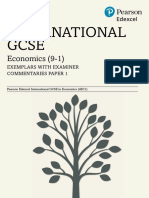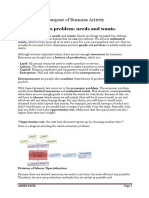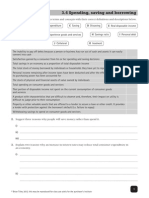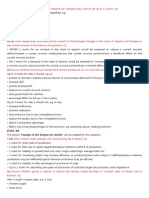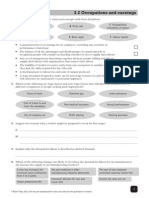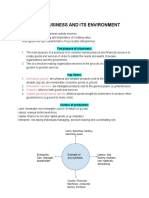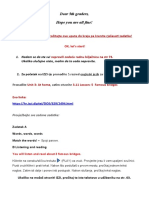Revision Checklist For Igcse Business Studies
Revision Checklist For Igcse Business Studies
Uploaded by
Aisha KhanCopyright:
Available Formats
Revision Checklist For Igcse Business Studies
Revision Checklist For Igcse Business Studies
Uploaded by
Aisha KhanOriginal Description:
Original Title
Copyright
Available Formats
Share this document
Did you find this document useful?
Is this content inappropriate?
Copyright:
Available Formats
Revision Checklist For Igcse Business Studies
Revision Checklist For Igcse Business Studies
Uploaded by
Aisha KhanCopyright:
Available Formats
REVISION CHECKLIST FOR IGCSE BUSINESS STUDIES (Mock exam)
Section
Business and the environment in which it operates You should be able to:
Describe and classify business activity in terms of
Checklist
Comments
primary, secondary and tertiary sectors.
Demonstrate an awareness of and show understanding of the changes that have taken place in primary, secondary and tertiary sectors 4 factors of production. Capital and Labour intensive businesses. Ways to measure the size of a business Describe and explain: the private sector and the public sectors the role of the different groups involved in business activity and their objectives: consumers, employees, managers, owners, finance providers and shareholders Identify and explain the advantages and drawbacks of: sole trader partnership Private Limited company (Ltd) Public Limited company (plc.) Franchise Joint venture Explain the difference between limited and unlimited liability. State what is meant by a multinational business Identify the reasons for the importance of multinational business identify the reasons for the growth of multinational business Draw a simple organisational chart interpret and explain an organisational chart comment on the main features of an organizational chart explain what is meant by chain of command explain what is meant by span of control and delegation. explain what is meant by hierarchy. Finance, Production, Marketing and Human Resource Departments in an organization and activities/functions performed by each of them.
Human Resources: Internal Organisation
Human Resources: Departmental Functions
Human Resources: Communication
Explain: internal communication external communication the different channels of communication. Explain the methods of communication: Face to face, written communication and Electronic Communication. when different methods of communication are the most appropriate to use
Marketing
what barriers to effective communication might arise in a business how barriers to effective communication might be overcome the need for effective internal communication Describe what role marketing plays in a business Appreciate why market research is needed Understand meaning of both primary and secondary research and methods of both researches with examples. Explain the limitations of research. Appreciate when the different types of primary or secondary research methods might be the most appropriate to use in a particular situation. Understand: how market segmentation is carried out why market segmentation is carried out the difference between mass marketing and niche Marketing. Meaning of market share. Understanding the Boston Matrix.
Marketing: (Product, Price, Promotion and Place)
Marketing:
Price
Understand the importance of: design to the product packaging and the functions of packaging Know what is meant by: a brand image brand name Demonstrate an understanding of product life cycles and be able to identify where a particular product is in its product life cycle. Label the main stages of a product life cycle Identify appropriate extension strategies for products Understand the importance of pricing in the marketing mix Explain: cost-plus pricing penetration pricing price skimming competitive pricing promotional pricing Select an appropriate pricing strategy for a particular product.
Marketing:
Promotion
Understand the role of promotion in the marketing mix (promotion includes - advertising, promotion, personal selling, public relations) Explain the difference between persuasive and informative advertising. Explain the different types of promotion and appreciate when they would be appropriate to use (e.g. free gifts, competitions, point of sale displays, money off coupons, after sales service) Explain the different types of advertising and appreciate when they would be appropriate to use (e.g. TV, radio, newspapers and magazines, cinema, posters/billboards, Internet, leaflets/direct mail) Select appropriate forms of promotion for a particular product Understand the role place plays in the marketing mix Appreciate the different channels of distribution Appreciate the role of the wholesaler Appreciate the factors that affect which channel of Distribution to use and be able to select an appropriate channel of distribution to use for a particular situation. Explain the different types of transport available to transport a product (e.g. road haulage, rail, river and canal, sea freight, air freight, pipeline) Select the most suitable type of transport available for a particular product. Understand how a marketing strategy can be developed by linking the four Ps of the marketing mix together. Understand how the marketing mix will need to change as a product goes through the different stages of the product life cycle. Show an awareness of the need for a marketing budget Meaning of production and productivity. Explain what is meant by: job production batch production flow production Appreciate when the different methods of production would be suitable to use. Identify and explain internal and external economics of scale (e.g. financial, managerial, marketing, risk-bearing, technical/production) Identify and explain diseconomies of scale. Understand what is meant by lean production. Total Quality Management. Use of technology in production.
Marketing:
Promotion
Marketing:
Place.
Marketing:
Production
Human Resources
Human Resources
Explain: why people work (to satisfy human needs) the different methods of financial rewards (e.g. salary, time rate, piece rate, bonus, profit sharing) the different methods of non-financial rewards (e.g. free accommodation, company car, free health care) Appreciate when these financial and non-financial rewards may be appropriate for a particular situation Explain why motivation is important to a business Understand how workers can be motivated (motivation theories would be useful here e.g. Maslow, Herzberg) Appreciate which methods of motivation are appropriate in particular situations. Meaning of Minimum Wages and its Importance.
Human Resources
Explain the recruitment and selection process including: Job description Job (person) specification Job advertisement Interviews/selection process Induction training Understand when internal or external recruitment is appropriate in particular situations Explain different training methods (induction, on the job training and off the job training) Appreciate when different training methods would be appropriate to use in particular situations.
Key Tips to improve your grade. While studying :
Prepare summary notes with key points / main points. Study definitions well. Highlight important information and revise it before exam. Use above check list to check your progress and mark a tick for completion of each aspect completed.
While writing exam:
Understand and explain keywords, terms and concepts. Describe keywords accurately and in detail and use them appropriately. Answer the question from the point of view of the business itself as mentioned in case study information Justify a recommended course of action for a business to take. Give reasons for particular explanations and elaborate as per the marks allotted for the questions.
You might also like
- A Level Business Formula (Copy)Document1 pageA Level Business Formula (Copy)ducnguyentri.vinuniNo ratings yet
- Ial WBS03 01 Oct19Document20 pagesIal WBS03 01 Oct19Aney Abdul Motalib100% (3)
- Side by Side 1 Test 2Document3 pagesSide by Side 1 Test 2nlucy2226100% (1)
- Archetypal Booklet DigitalDocument89 pagesArchetypal Booklet DigitalVinícius LopesNo ratings yet
- Igcse Business Studies Workbook AnswersDocument51 pagesIgcse Business Studies Workbook AnswersMateo VegnaduzziNo ratings yet
- IG Economics Paper 1 Exemplar Responses With CommentariesDocument37 pagesIG Economics Paper 1 Exemplar Responses With CommentariesShibraj DebNo ratings yet
- Lesson 26-50 Grammar and TranslationDocument176 pagesLesson 26-50 Grammar and TranslationRamil Qgec100% (1)
- Past Questions As Level BusinessDocument8 pagesPast Questions As Level BusinessShanavaz AsokachalilNo ratings yet
- Economics IGCSE 4EC0 4EC1 IntroductionDocument24 pagesEconomics IGCSE 4EC0 4EC1 IntroductionWandaNo ratings yet
- Cambridge O Level: Business Studies 7115/11 October/November 2020Document20 pagesCambridge O Level: Business Studies 7115/11 October/November 2020r3za_5008No ratings yet
- IGCSE Business StudiesDocument133 pagesIGCSE Business StudiesAhmed Patel60% (5)
- IGCSE Business Glossary PDFDocument6 pagesIGCSE Business Glossary PDFSenu AustinNo ratings yet
- Business Studies IGCSE - Unit 1. Chapter 3. Forms of Business Org PDFDocument8 pagesBusiness Studies IGCSE - Unit 1. Chapter 3. Forms of Business Org PDFNadine Salah El-DinNo ratings yet
- Igcse Economics Rev NotesDocument69 pagesIgcse Economics Rev Noteskityk60% (5)
- Rhetorical Analysis EssayDocument4 pagesRhetorical Analysis Essayapi-285388077No ratings yet
- Lesson Plan Seasons First LessonDocument6 pagesLesson Plan Seasons First Lessonapi-248586362No ratings yet
- ASHP Best Practices 2015-2016 PDFDocument793 pagesASHP Best Practices 2015-2016 PDFAhmad MakhloufNo ratings yet
- IGCSE Edexcel Business Studies NotesDocument27 pagesIGCSE Edexcel Business Studies NotesEllie HousenNo ratings yet
- IGCSE Economics Past PaperDocument12 pagesIGCSE Economics Past Paperspring1127100% (1)
- Economics Notes From IGCSE AID PDF FORMATDocument74 pagesEconomics Notes From IGCSE AID PDF FORMATSimonaNo ratings yet
- IGCSE ECONOMICS: Spending, Saving and BorrowingDocument2 pagesIGCSE ECONOMICS: Spending, Saving and Borrowingkbafna28100% (3)
- Enterprises, Business Growth and Size. IGCSE Business Studies PDFDocument22 pagesEnterprises, Business Growth and Size. IGCSE Business Studies PDFLamar100% (1)
- IGCSE Economics - Past Paper Questions - Structured Paper (Paper 2)Document12 pagesIGCSE Economics - Past Paper Questions - Structured Paper (Paper 2)spring112756% (9)
- BST Activity Worksheet Chapter 6Document1 pageBST Activity Worksheet Chapter 6arab song100% (1)
- Business Studies HomeworkDocument10 pagesBusiness Studies Homeworkapi-248004746100% (1)
- IAL Business Editable Scheme of WorkDocument40 pagesIAL Business Editable Scheme of WorkkulsumNo ratings yet
- Chapter 15 - The Marketing Mix - PromotionDocument18 pagesChapter 15 - The Marketing Mix - PromotionHassan Shahid100% (1)
- IGCSE Business Studies Checklist CWDocument23 pagesIGCSE Business Studies Checklist CWEm Wade100% (6)
- 0452 Specimen Paper Answers Paper 2 (For Examination From 2020)Document26 pages0452 Specimen Paper Answers Paper 2 (For Examination From 2020)Divya SinghNo ratings yet
- Edexcel IGCSE Economics Blue Section SummaryDocument4 pagesEdexcel IGCSE Economics Blue Section SummaryAnnikaZimmermannNo ratings yet
- Exemplar Coursework Project For Paper 2 PDFDocument64 pagesExemplar Coursework Project For Paper 2 PDFMohammed ZohairNo ratings yet
- Business Studies IGCSE Notes C HuruDocument101 pagesBusiness Studies IGCSE Notes C HuruIrie LeafNo ratings yet
- Igcse Economics Revision Checklist PDFDocument4 pagesIgcse Economics Revision Checklist PDFRajeev SinghNo ratings yet
- IGCSE Today - Business DefinitionsDocument55 pagesIGCSE Today - Business DefinitionsIGCSE Today100% (1)
- IGCSE Economics Structured QuestionDocument119 pagesIGCSE Economics Structured Questionalicia100% (1)
- AO2 Analysis Exercises and ActivitiesDocument9 pagesAO2 Analysis Exercises and ActivitiesBhavishka ValraniNo ratings yet
- IGCSE Business Studies Essential Book Answers For Unit 5Document6 pagesIGCSE Business Studies Essential Book Answers For Unit 5emonimtiazNo ratings yet
- Business Studies IgcseDocument115 pagesBusiness Studies IgcsexNo ratings yet
- Business Studies 0450 Paper 1Document12 pagesBusiness Studies 0450 Paper 1grace100% (1)
- Igcse Business BookDocument103 pagesIgcse Business BookhomamunfatNo ratings yet
- Economics NotesDocument37 pagesEconomics Notesrafehsd100% (1)
- IGCSE ECONOMICS: Factor PaymentsDocument2 pagesIGCSE ECONOMICS: Factor Paymentskbafna28100% (1)
- Ib Business and Management Command TermsDocument2 pagesIb Business and Management Command TermsParul KNo ratings yet
- Cambridge O Level: 7115/21 Business StudiesDocument12 pagesCambridge O Level: 7115/21 Business StudiesfallonNo ratings yet
- Economics (0455) Example Candidate Response 2014Document79 pagesEconomics (0455) Example Candidate Response 2014RealRandomGuy100% (2)
- IGCSE MCQ ChecklistDocument8 pagesIGCSE MCQ ChecklistDhrisha GadaNo ratings yet
- Business Studies Notes For IGCSEDocument21 pagesBusiness Studies Notes For IGCSEsonal100% (2)
- Exam Technique - CIE IGCSE Business StudiesDocument11 pagesExam Technique - CIE IGCSE Business Studiesabiharehan196100% (1)
- Business AS NotesDocument114 pagesBusiness AS NotesMohamedNo ratings yet
- Cambridge A-Level Business - CHP 27Document15 pagesCambridge A-Level Business - CHP 27SitayeshNo ratings yet
- Market BubblesDocument2 pagesMarket BubblesAdeeba iqbalNo ratings yet
- IGCSE Business Studies A - Notes C2 People in BusinessDocument21 pagesIGCSE Business Studies A - Notes C2 People in BusinessmohamedNo ratings yet
- 1 3 Enterprise Business Growth and SizeDocument7 pages1 3 Enterprise Business Growth and Sizeaboudd30100% (1)
- 0454 Enterprise Coursework Exemplar Materials WEBDocument64 pages0454 Enterprise Coursework Exemplar Materials WEBRichard Lancaster-Shanks0% (1)
- Ans Ch25 Igcse Bus ST TCDDocument4 pagesAns Ch25 Igcse Bus ST TCDyawahabNo ratings yet
- 0455 Example Candidate 0455-Responses For Examination From 2014Document79 pages0455 Example Candidate 0455-Responses For Examination From 2014Mohamed Tarek100% (1)
- Caie Igcse Economics 0455 Theory v2Document18 pagesCaie Igcse Economics 0455 Theory v2omNo ratings yet
- UG022510 International GCSE in Business Studies 4BS0 For WebDocument57 pagesUG022510 International GCSE in Business Studies 4BS0 For WebAnonymous 8aj9gk7GCLNo ratings yet
- Caie As Economics 9708 Model Answers v1Document11 pagesCaie As Economics 9708 Model Answers v1Uzair siddiqui100% (1)
- MAY / JUNE 2006 P1 Short Answer EssayDocument20 pagesMAY / JUNE 2006 P1 Short Answer EssayNafisa MeghaNo ratings yet
- Cambridge IGCSE™: Business Studies 0450/11 May/June 2021Document21 pagesCambridge IGCSE™: Business Studies 0450/11 May/June 2021Imran Ali100% (2)
- Chapter 20, 21 & 22Document18 pagesChapter 20, 21 & 22sk001100% (1)
- Cambridge Made a Cake Walk: IGCSE Accounting theory- exam style questions and answersFrom EverandCambridge Made a Cake Walk: IGCSE Accounting theory- exam style questions and answersRating: 2 out of 5 stars2/5 (4)
- ABE Strategic Marketing Management Examination Tips June 2014Document6 pagesABE Strategic Marketing Management Examination Tips June 2014JailamNo ratings yet
- KS4 Reversible ReactionsDocument25 pagesKS4 Reversible ReactionsAisha KhanNo ratings yet
- An Unknown GirlDocument31 pagesAn Unknown GirlAisha Khan100% (2)
- Risk Factors and TreatmentsDocument1 pageRisk Factors and TreatmentsAisha KhanNo ratings yet
- As SNAB Revision NotesDocument49 pagesAs SNAB Revision NotesXneo KMeng 茗茗 ~No ratings yet
- OCR Cells Exchange and Transport Question and AnswersDocument12 pagesOCR Cells Exchange and Transport Question and AnswersAisha KhanNo ratings yet
- Core Practical Vitamin CDocument2 pagesCore Practical Vitamin CAisha KhanNo ratings yet
- Understanding The Value of A BI Center of ExcellenceDocument5 pagesUnderstanding The Value of A BI Center of Excellencesridhar_eeNo ratings yet
- (Kunci) Soal Sas Genap Bahasa Inggris Kelas Xi 2024Document6 pages(Kunci) Soal Sas Genap Bahasa Inggris Kelas Xi 2024khayrunaa3No ratings yet
- Soal Pas B. Inggris Kelas 10 Smster Genap 2023.2024Document12 pagesSoal Pas B. Inggris Kelas 10 Smster Genap 2023.2024Achmad NaufalNo ratings yet
- Piaggio Liberty 100 Liberty 100 4T (Vietnam) 2011-2014 PDFDocument82 pagesPiaggio Liberty 100 Liberty 100 4T (Vietnam) 2011-2014 PDFMegahahdy Anugrah0% (1)
- Complete These Sentences by Using Correct Verb. Choose Simple Present Tense, Simple Past Tense, or Present Perfect Tense!Document9 pagesComplete These Sentences by Using Correct Verb. Choose Simple Present Tense, Simple Past Tense, or Present Perfect Tense!Novel PDFNo ratings yet
- Jurnal Padi PDFDocument7 pagesJurnal Padi PDFGrassellaNo ratings yet
- Local Govt-Case DigestsDocument16 pagesLocal Govt-Case DigestsJL A H-DimaculanganNo ratings yet
- Cambridge School HomeworkDocument6 pagesCambridge School Homeworkafnokxhitulprs100% (1)
- Gmail - FWD - Jaka - 9286062 Confirmation of Business Visa Appointment at The German Embassy in JakartaDocument2 pagesGmail - FWD - Jaka - 9286062 Confirmation of Business Visa Appointment at The German Embassy in JakartadjokoNo ratings yet
- CA FINAL LAW Additional Questions May 2021Document108 pagesCA FINAL LAW Additional Questions May 2021Aneek JainNo ratings yet
- Psychotherapists OutcomeDocument15 pagesPsychotherapists Outcomemetamorfose_23No ratings yet
- Grammar Revision TestDocument3 pagesGrammar Revision TestTharki VineNo ratings yet
- Empirical Tests of Status Consumption:Evidence From Women's Cosmetics - Angela Chao and Juliet B. SchorDocument25 pagesEmpirical Tests of Status Consumption:Evidence From Women's Cosmetics - Angela Chao and Juliet B. SchorAngela ChaoNo ratings yet
- Fast Track Project Manager: Dubai Municipality Registered Civil Engineer (Unlimited)Document3 pagesFast Track Project Manager: Dubai Municipality Registered Civil Engineer (Unlimited)Mohanq RamaNo ratings yet
- Private International LawDocument11 pagesPrivate International Lawanne leeNo ratings yet
- Accounting For Manufacturing ConcernDocument2 pagesAccounting For Manufacturing ConcernAhmed MemonNo ratings yet
- Asta Calisthenics Workout PDFDocument13 pagesAsta Calisthenics Workout PDFfreakyryan8No ratings yet
- Assignment 3 LRWIIDocument4 pagesAssignment 3 LRWIIAnonymous DxiKHQNo ratings yet
- 5 Paragraph Essay Examples Middle SchoolDocument6 pages5 Paragraph Essay Examples Middle Schoold3gymd53100% (2)
- IEEE Standard Definitions For Use in Reporting Electric Generating Unit Reliability, Availability, and ProductivityDocument30 pagesIEEE Standard Definitions For Use in Reporting Electric Generating Unit Reliability, Availability, and Productivitycantorband8234100% (1)
- 26.3. Famous BridgesDocument3 pages26.3. Famous BridgesNina PericaNo ratings yet
- The Fundamentals of Regression Analysis PDFDocument99 pagesThe Fundamentals of Regression Analysis PDFkatie farrellNo ratings yet
- Grade 11 Revision QuestionsDocument12 pagesGrade 11 Revision QuestionsSaheed AbdulkarimNo ratings yet
- Grade 9 - 2nd Quarter - Week 8 Day 3 - 4Document17 pagesGrade 9 - 2nd Quarter - Week 8 Day 3 - 4zero kakumaruNo ratings yet






